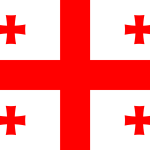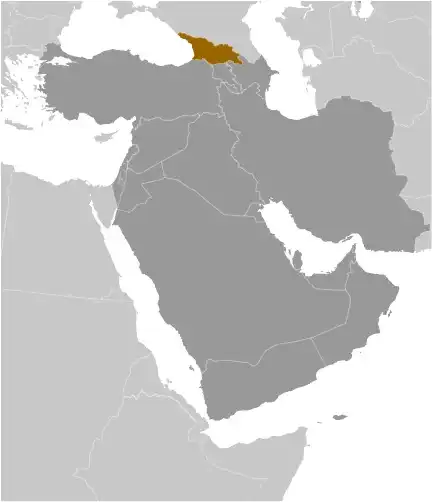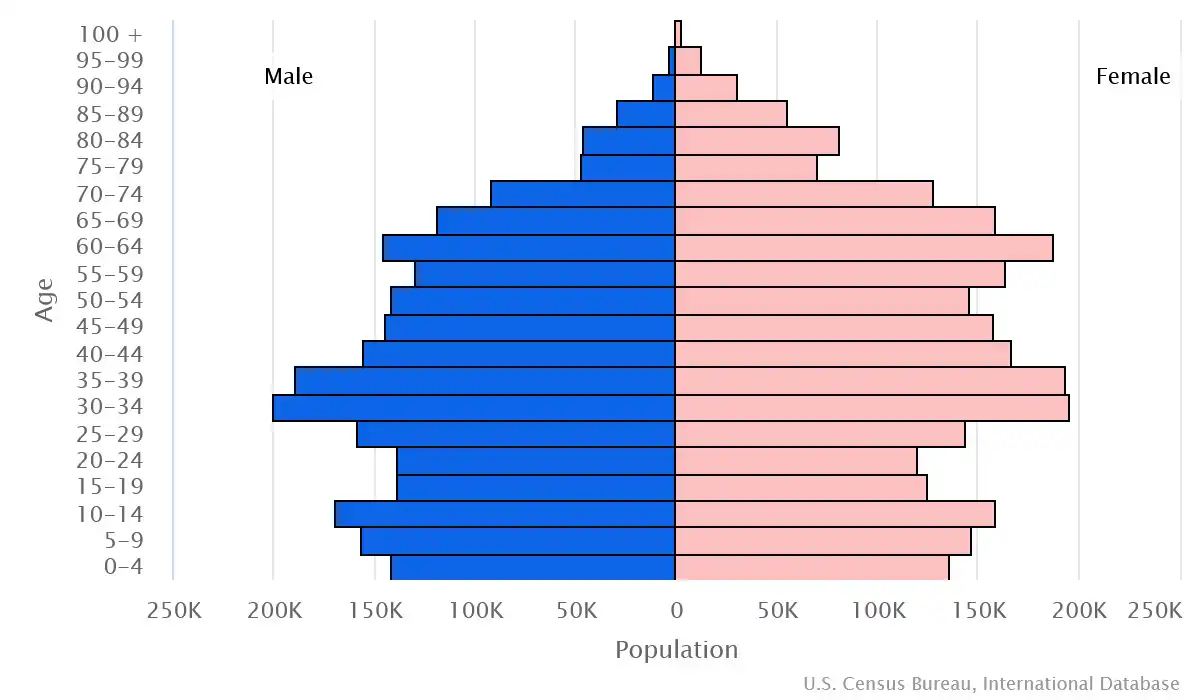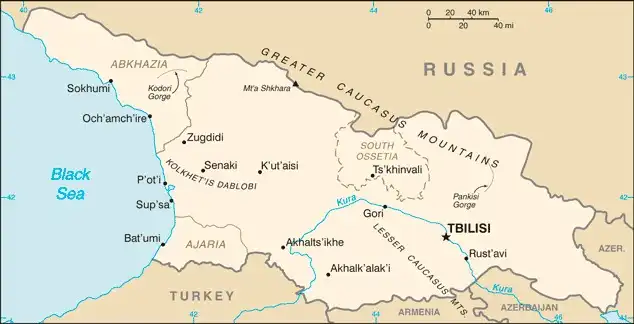
Georgia
Country Data Dashboard

| Government type: | semi-presidential republic |
| Capital: | Tbilisi |
| Languages: | Georgian (official) 87.6%, Azeri 6.2%, Armenian 3.9%, Russian 1.2%, other 1% (including Abkhaz, the official language in Abkhazia) (2014 est.) |
People & Society
Ethnicity (2014 est.)
Religion (2014 est.)
Age structure

Economy
Economic overview
main economic activities include cultivation of agricultural products, such as grapes, citrus fruits, and hazelnuts; mining of manganese, copper, and gold; producing alcoholic and nonalcoholic beverages
Real GDP (purchasing power parity) in Billion $
Real GDP per capita in $
Exports & Imports in billion $
Top 5 Import Partner in 2022 (50%)
Top 5 Import Commodities in 2022
- cars 🚗
- refined petroleum ⛽
- natural gas 💨
- packaged medicine 💊
- copper ore 🟧🪙
Top 5 Export Partner in 2022 (50%)
Top 5 Export Commodities in 2022
- copper ore 🟧🪙
- cars 🚗
- fertilizers 💩
- iron alloys 🪓
- wine 🍷
Geography
Map

Area
Natural resources
- timber 🌲
- hydropower 💧⚡
- manganese deposits 🪙
- iron ore ⛓️
- copper 🟧🪙
- minor coal and oil deposits; coastal climate and soils allow for important tea and citrus growth 🛢️
Climate
warm and pleasant; Mediterranean-like on Black Sea coast
Historical Background Information
The region of present-day Georgia once contained the ancient kingdoms of Colchis (known as Egrisi locally) and Kartli-Iberia. The area came under Roman influence in the first centuries A.D., and Christianity became the state religion in the 330s. Persian, Arab, and Turk domination was followed by a Georgian golden age (11th-13th centuries) that was cut short when the Mongols invaded in 1236. Subsequently, the Ottoman and Persian empires competed for influence in the region. Georgia was absorbed into the Russian Empire in the 19th century. Independent for three years (1918-1921) following the Russian revolution, it was forcibly incorporated into the USSR in 1921 and regained its independence when the Soviet Union dissolved in 1991.
In 2003, mounting public discontent over rampant corruption, ineffective government services, and a government attempt to manipulate parliamentary elections touched off widespread protests that led to the resignation of Eduard SHEVARDNADZE, who had been president since 1995. In the aftermath of this "Rose Revolution," new elections in 2004 swept Mikheil SAAKASHVILI and his United National Movement (UNM) party into power. SAAKASHVILI made progress on market reforms and governance, but he faced accusations of abuse of office. Progress was further complicated when Russian support for the separatist regions of Abkhazia and South Ossetia led to a five-day conflict between Russia and Georgia in August 2008, which included Russia invading large portions of Georgian territory. Russia initially pledged to pull back from most Georgian territory but then unilaterally recognized the independence of Abkhazia and South Ossetia, and Russian military forces have remained in those regions.
Billionaire Bidzina IVANISHVILI's unexpected entry into politics in 2011 brought the divided opposition together under his Georgian Dream coalition, which won a majority of seats in the 2012 parliamentary elections and removed UNM from power. Conceding defeat, SAAKASHVILI named IVANISHVILI as prime minister and left the country after his presidential term ended in 2013. IVANISHVILI voluntarily resigned from office after the presidential succession, and in the years since, the prime minister position has seen frequent turnover. In 2021, SAAKASHVILI returned to Georgia, where he was immediately arrested to serve six years in prison on outstanding abuse-of-office convictions.
Popular support for integration with the West is high in Georgia. Joining the EU and NATO are among the country's top foreign policy goals, and Georgia applied for EU membership in 2022, becoming a candidate country in December 2023. Georgia and the EU have a Deep and Comprehensive Free Trade Agreement, and since 2017, Georgian citizens have been able to travel to the Schengen area without a visa.
